background-image: url("https://raw.githubusercontent.com/EstherPlomp/PRES-data-software/main/images/OSC-data-software.jpg") background-position: 80% 80% background-size: 40% ## Open Science: Crash Course #### Open Data/Software: What, when, how? Slides by [**Esther Plomp**](https://estherplomp.github.io/) @ TU Delft, Faculty of Applied Sciences License: CC-BY [Link slides](https://estherplomp.github.io/PRES-data-software/) --- class: inverse, center, middle # Open Science --- # Open Science .pull-left[ 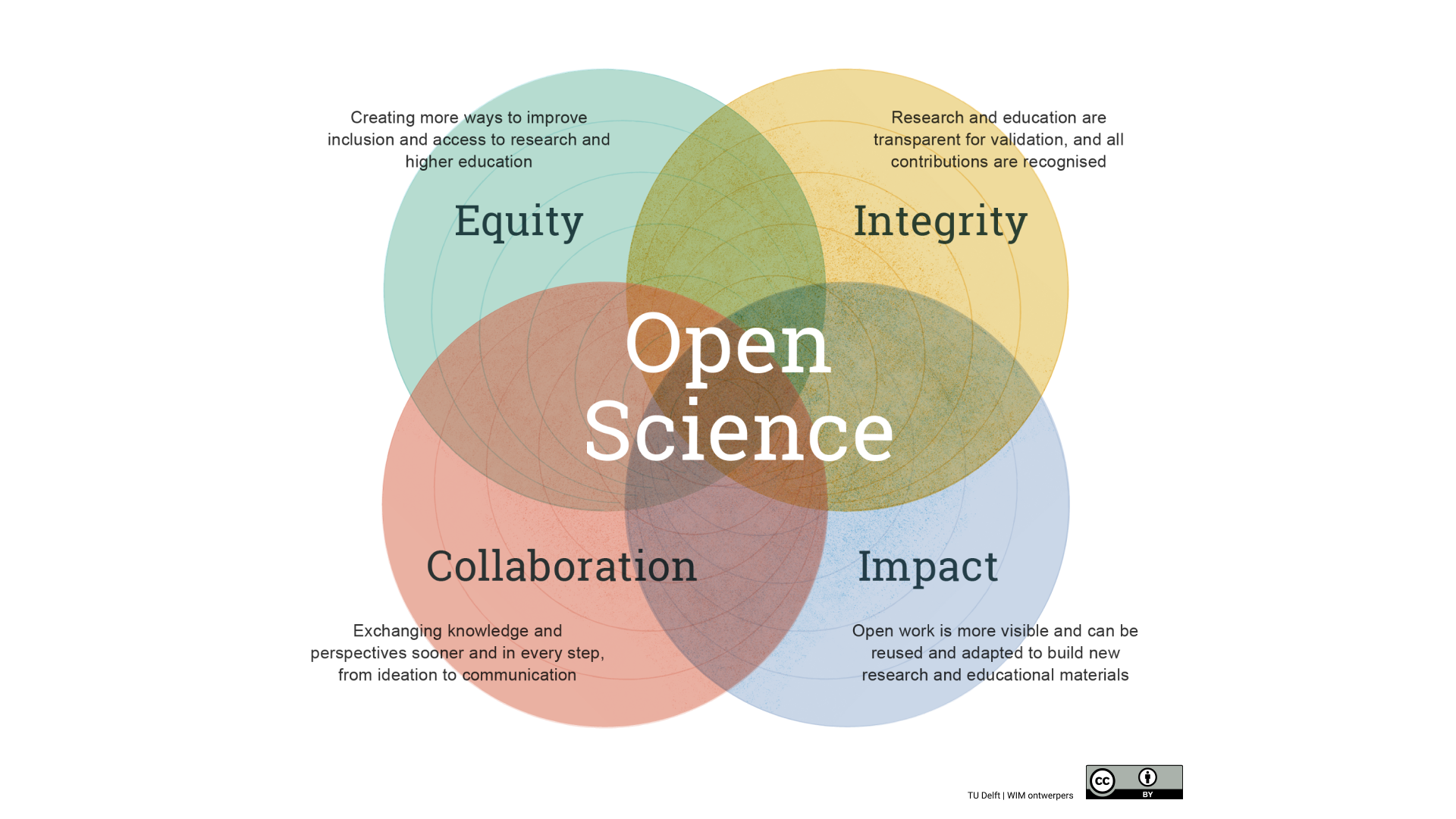] .pull-right[ **Open Data** **Open Software** **Open Education** **Open Hardware** **Open Methods** **Open Publishing** **Collaboration (community, inclusion)** **Citizen Science** ] .footnote[[tudelft.nl/openscience](https://www.tudelft.nl/open-science)] --- class: inverse, middle, center # Open Data --- background-image: url("https://raw.githubusercontent.com/EstherPlomp/PRES-data-software/main/images/data-management-plan.jpg") background-position: 80% 80% background-size: 50% # Planning for Open Data **Data Management Plan (DMP)** to plan how to manage and share the data (see [The Turing Way for more information](https://the-turing-way.netlify.app/reproducible-research/rdm/rdm-dmp.html)) TU Delft has access to [DMPonline](dmponline.tudelft.nl/) with TU Delft specific templates and guidance .footnote[image by [The Turing Way](https://doi.org/10.5281/zenodo.3332807)] --- background-image: url("https://raw.githubusercontent.com/EstherPlomp/2022-PRES-Data/main/images/tidydata_3-small.jpg") background-position: 100% 100% background-size: 80% # Data Organisation .footnote[Image by [Allison Horst](https://github.com/allisonhorst/stats-illustrations)] --- ## File naming - 20220113-PRES-Data-V001 - [8 step guide](https://resolver.caltech.edu/CaltechAUTHORS:20200601-161923247) on how to set up your file naming convention - [Presentation on file naming](https://speakerdeck.com/jennybc/how-to-name-files) - [Stanford’s best practices](https://library.stanford.edu/research/data-management-services/data-best-practices/best-practices-file-naming) -- ## Folder structure - Templates by [Colomb et al.](https://doi.org/10.5281/zenodo.4410128), [Nikola](http://nikola.me/folder_structure.html) and [Barbara Vreede](https://github.com/bvreede/good-enough-project) for [cookiecutter](https://github.com/cookiecutter/cookiecutter) - [Find Files Faster](https://zapier.com/blog/organize-files-folders/): How to Organize Files and Folders - [Data Management: File organisation](https://surfdrive.surf.nl/files/index.php/s/gJtISAQABapLvnI) by Christine Malinowski - [Videos on project structure](https://www.youtube.com/watch?v=u6MiDFvAs9w&list=PLRPB0ZzEYegPiBteC2dRn95TX9YefYFyy&index=2) by Danielle Navarro - Software: [Cookiecutter template by Barbara Vreede](https://github.com/bvreede/good-enough-project) based on [Wilson 2017](https://doi.org/10.1371/journal.pcbi.1005510) --- # Data Organisation .pull-left[ [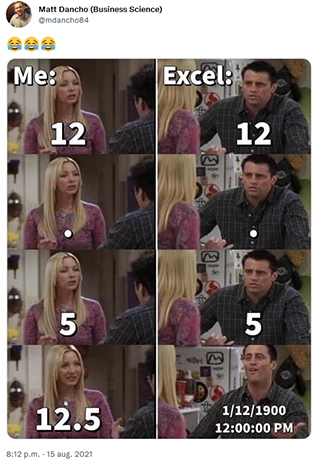](https://twitter.com/mdancho84/status/1426970168660529153)] .pull-right[ ## Spreadsheets - [Spreadsheet organisation tips](https://surfdrive.surf.nl/files/index.php/s/9aNX69fsWyAnMI8) - [Broman and Woo 2018](https://doi.org/10.1080/00031305.2017.1375989) - [Wickham 2014](https://vita.had.co.nz/papers/tidy-data.html) - Use tools for data validation like [OpenRefine](https://openrefine.org/) ## Why? What could possibly go wrong? - [a lot](http://www.eusprig.org/horror-stories.htm) ] --- # Data Documentation .pull-left[ [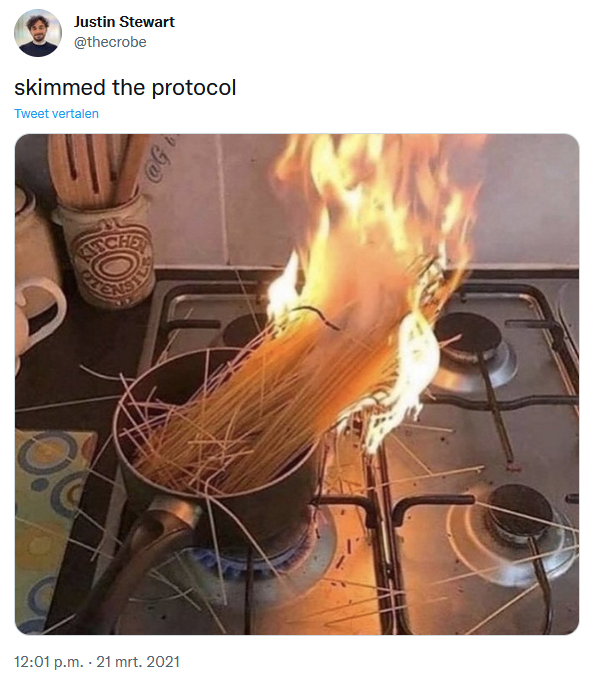](https://twitter.com/thecrobe/status/1373590641012322306)] .pull-right[ - (electronic) Labnotes: TU Delft provides [licenses for eLABjournal and Rspace](https://www.tudelft.nl/en/library/research-data-management/r/manage/electronic-lab-notebook) - Readme files ([template](https://cornell.app.box.com/v/ReadmeTemplate)) - [Guide for data documentation](https://doi.org/10.5281/zenodo.1914401) - [Data Dictionary](https://uf-repro.github.io/data-organization/slides.html) - [Code Book](https://libguides.library.kent.edu/SPSS/Codebooks) #### More information - Book: Data Management for Researchers by Kristin Briney - [A Quick Guide to Organizing Computational Biology Projects](https://doi.org/10.1371/journal.pcbi.1000424) by William Noble - [Some Simple Guidelines for Effective Data Management](https://doi.org/10.1890/0012-9623-90.2.205) by Borer et al. ] --- background-image: url("https://raw.githubusercontent.com/EstherPlomp/PRES-data-software/main/images/fountain-of-open-data.jpg") background-position: 100% 100% background-size: 40% # Open Data made freely available for use and re-use by anyone and everyone **Access** : Available (on the internet) to all on demand **Reuse/distribution** : Provided under terms that permit reuse and redistribution **Transparency** : Providing information about data generation/collection **Interoperability** : Interoperability with other data, machine readable formats **Participation** : Everyone must be able to use, reuse and redistribute **Equity** : Data is not truly open if the research process is not open to all .footnote[ [#bropenscience is broken science](https://thepsychologist.bps.org.uk/volume-33/november-2020/bropenscience-broken-science) by Kirstie Whitaker and Olivia Guest [Open Science Beyond Open Access: For and with communities](https://doi.org/10.5281/zenodo.3946773) image by [The Turing Way](https://doi.org/10.5281/zenodo.3332807)] --- # Not Open Data .pull-left[ [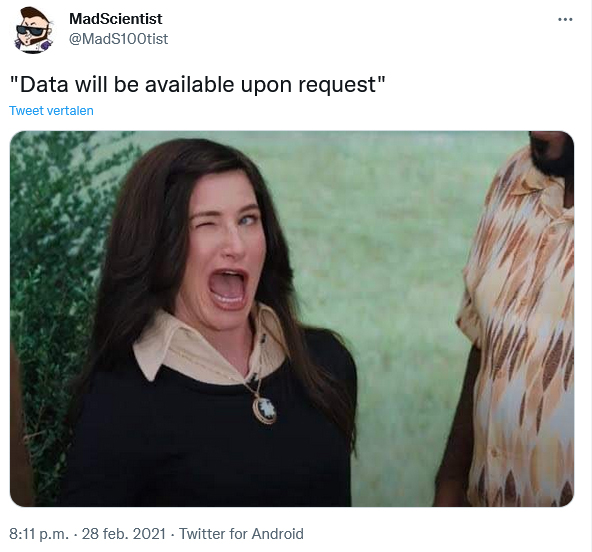](https://twitter.com/MadS100tist/status/1366103674989277185) ] .pull-right[ '[odds of obtaining the dataset] fell by 17% per year' [Vines et al. 2014](https://doi.org/10.1016/j.cub.2013.11.014) ‘research data cannot be reliably preserved by individual researchers’ - [Vines et al. 2014](https://doi.org/10.1016/j.cub.2013.11.014) "We received no response to 41.3% of our data requests" - [Tedersoo et al. 2021](https://doi.org/10.1038/s41597-021-00981-0) [Meme explanation](https://knowyourmeme.com/memes/agnes-harkness-winking) ] --- # Open Data .pull-left[ [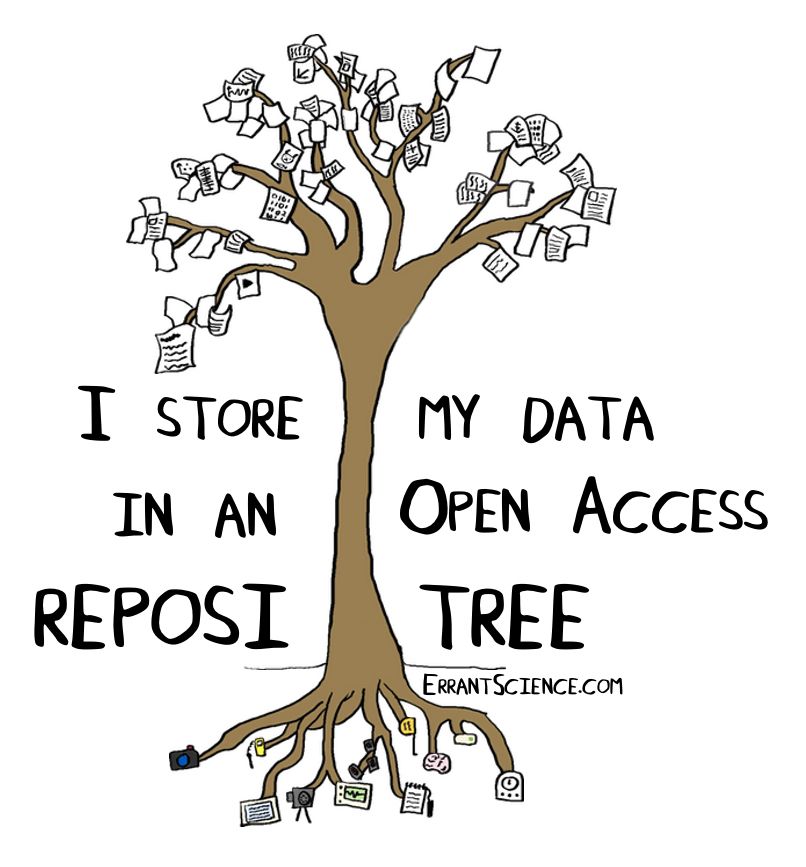](https://twitter.com/ErrantScience/status/1251118457279647746) ] .pull-right[ ## data repository online archive that curates research datasets and provides long-term access - Finalised datasets - ~10-15 years (Long term preservation) - Access - DOI = more citations/visibility - File format support [How can you make research data accessible?](https://www.software.ac.uk/how-can-you-make-research-data-accessible) by Esther Plomp] --- # Open Data .pull-left[ [](https://twitter.com/ErrantScience/status/1251118457279647746) ] .pull-right[ ## How to find a repository? - Check publications in your field - [FAIRsharing](https://fairsharing.org/) - [re3data](https://www.re3data.org/) General repositories: - [4TU.ResearchData](https://researchdata.4tu.nl/en/) - [Zenodo](https://zenodo.org/) ] --- # Open Data A **Data Article** (also known as a Data Paper/Note/Release, or Database article) is a publication that is focused on the description of a dataset. More information on [The Turing Way](https://the-turing-way.netlify.app/reproducible-research/rdm/rdm-article.html) and [TU Delft specific information](https://openworking.wordpress.com/2022/02/17/publishing-a-data-article/) --- class: inverse, middle, center # Open Software --- background-image: url("https://raw.githubusercontent.com/EstherPlomp/PRES-data-software/main/images/recognition.jpg") background-position: 100% 100% background-size: 50% #Open Software Software in which the copyright holder has granted a license to **use, study, change, and/or distribute the source code.** - [opensource.org](https://opensource.org/definition) Sharing Software allows for - Scrutiny of methods / increased **reproducibility** - see [Krafczyk et al. 2021](https://doi.org/10.1098/rsta.2020.0069) p5-11 for recommendations - **Collaboration** - **Credit** See also: [Making software FAIR?](https://openworking.wordpress.com/2019/12/16/making-software-fair/) for more resources .footnote[image by [The Turing Way](https://doi.org/10.5281/zenodo.3332807)] --- # Version control Version control allows you to **easily track changes**, both your own changes as well as those made by collaborators (for example, Git) By configuring your version control system to use GitHub, GitLab or Bitbucket, you’ll have **backups** of every version. Follow this [webinar for an introduction to GitHub](https://www.youtube.com/watch?v=lRW8mlpTw5M). You can also use [TU Delft GitLab](https://gitlab.tudelft.nl/). These platforms offer **collaboration tools** (issue tracker and project management tools), and you’ll be able to use third-party **services** such as code quality checkers, correctness checkers. image by [The Turing Way](https://doi.org/10.5281/zenodo.3332807) [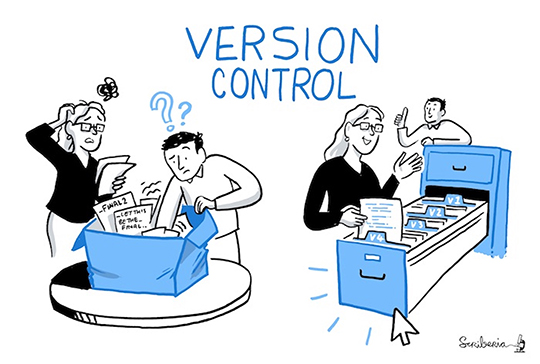](https://doi.org/10.5281/zenodo.3332807) ] --- # Also useful if you do not code - Working together on projects ([Open Life Science](https://github.com/open-life-science/open-life-science.github.io), [The Turing Way](https://github.com/alan-turing-institute/the-turing-way)) - [Live demo of collaborative working](https://youtu.be/KUgPlJIM6-E?t=1484) without code on GitHub - Setting up your website (see [Esther’s website](https://estherplomp.github.io/)) - Making your work available to others (slides, [newsletters](https://github.com/EstherPlomp/TNW-PhD-Newsletters )) - Keeping track of other projects (stars) - Project management tools ([Project Boards](https://docs.github.com/en/issues/organizing-your-work-with-project-boards/managing-project-boards/about-project-boards), [Issues](https://docs.github.com/en/issues/tracking-your-work-with-issues/about-issues)) --- # README - Landing page for your repo (watch [this video](https://www.youtube.com/watch?v=Jgv34Kwgga8&list=PL1CvC6Ez54KDvJbbdLn5rPvf1kInifEh9&index=7) for more info) - The 'Abstract' of your project - Who is involved in the project? - Invitation to others to contribute (what expertise is needed?) - On GitHub this is rendered in Markdown (language to format text) - [Markdown Cheatsheet](https://github.com/adam-p/markdown-here/wiki/Markdown-Cheatsheet) - [Emoji cheatsheet](https://www.webpagefx.com/tools/emoji-cheat-sheet) ### Examples: - [Jupyter](https://github.com/jupyter/jupyter#readme) & [scikit-learn](https://github.com/scikit-learn/scikit-learn) (written in Python) - [Matpower](https://github.com/MATPOWER/matpower) (written in MATLAB) - [Examples and explanation by Alex Chan](https://alexwlchan.net/2021/10/readmes-for-open-science/) - [Figures underlying Esther's article](https://github.com/EstherPlomp/Figures-Nd-data) - Templates: [#1](https://ha0ye.github.io/CW21-README-tips/template_README.html),[#2](https://github.com/othneildrew/Best-README-Template) --- # Getting a DOI for your GitHub Repository Summary of this [guide](https://guides.github.com/activities/citable-code/) 1. Have a repository in mind that you’re creating the identifier for 1. Set up an account at [Zenodo](https://zenodo.org/) (using your GitHub, email or [ORCID](https://orcid.org/)) 1. Connect GitHub/Zenodo by authorizing Zenodo 1. On Zenodo, go to Settings -> GitHub, then toggle the button on for the repository that you want an identifier for 1. On GitHub: create a new release for your repository (snapshot that will be preserved on Zenodo) 1. On Zenodo: go to the Upload tab and add any additional information before publishing. 1. On GitHub you can update your citation file with the DOI and add a DOI button in your Readme file 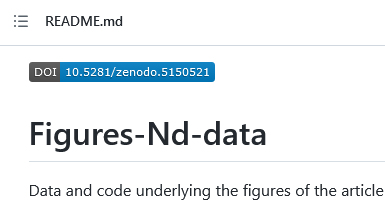 --- # Software Citation - Create a new file in your repository, name it CITATION.cff, select insert example, and fill out the template:  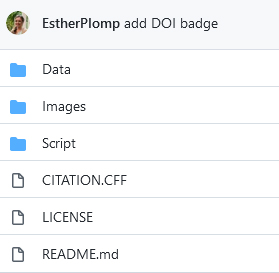 More information: [The Turing Way](https://the-turing-way.netlify.app/communication/citable/citable-cff.html) / [video](https://youtu.be/6yhuHCEjPNU) (& [slides](http://doi.org/10.5281/zenodo.4706180)) with tips --- background-image: url("https://raw.githubusercontent.com/EstherPlomp/PRES-data-software/main/images/software-publishing.jpg") background-position: 50% 50% background-size: 90% # Options for software sharing/publishing .footnote[ Slide by: Chue Hong, Neil (2021): Doing Science in the Digital Age (a personal journey as a data explorer). https://doi.org/10.6084/m9.figshare.17094365.v1 CC BY 4.0 ] --- # Checklist for software sharing - Have I assigned an **appropriate license** to my software? - Have I **described my software properly**, using an appropriate metadata format, and included this metadata file with my software? - Have I given my software a clear **version number**? - Have I determined the **authors to be credited** for this release of my software, and included this in my metadata file? - Have I procured a **persistent identifier** for this release of my software? - Have I added my **recommended citation** to the documentation for my software? #### Checklist for developers: https://doi.org/10.5281/zenodo.3482769 .footnote[ Slide by: Chue Hong, Neil (2021): Doing Science in the Digital Age (a personal journey as a data explorer). https://doi.org/10.6084/m9.figshare.17094365.v1 CC BY 4.0 ] --- # If you’re reusing Software of others - Have I **identified the software** which makes a significant and specialised contribution to my academic work? - Have I checked if the software has a **recommended citation**? - If this is to a paper, have I also cited the software directly? - If there’s no recommended citation, have I **created as complete a citation as possible**? - Who created the software - When it was created - Title of the software (and version if available) - Where the software can be accessed - Have I **referenced the software appropriately** in my academic work, complying with any citation formatting guidelines? #### Checklist for authors: https://doi.org/10.5281/zenodo.3479199 .footnote[ Slide by: Chue Hong, Neil (2021): Doing Science in the Digital Age (a personal journey as a data explorer). https://doi.org/10.6084/m9.figshare.17094365.v1 CC BY 4.0 ] --- class: inverse, middle, center # Why not supplemental materials? --- # Why not supplemental materials? **Data control**: cannot be updated **Interoperability**: not available in all formats which makes it difficult to integrate and interact with the data **Availability**: Difficult to access if the article is behind the paywall (supplemental materials are not included in the DOI and therefore the links can also break!) **Impact**: Data should be a primary research output **Publisher requirements**: Some publishers recommend using a data repository instead **Not FAIR**: Data/Software available in supplemental materials is not considered to be [FAIR](https://the-turing-way.netlify.app/reproducible-research/rdm/rdm-fair.html) (Findable, Accessible, Interoperable, Resuable) See also: [The Push to Replace Journal Supplements with Repositories](https://www.the-scientist.com/news-opinion/the-push-to-replace-journal-supplements-with-repositories--66296) --- layout: false ## Sustainable access to data/code <center><img src="https://raw.githubusercontent.com/EstherPlomp/PRES-data-software/main/images/commercial-infrastructure.jpg" alt="Two godzilla monsters are asking people for their time and money while if you take the open source way you can access digital infrastructure more sustainably" height="500px" /></center> .footnote[image by [The Turing Way](https://doi.org/10.5281/zenodo.3332807)] --- class: inverse, middle, center # Licenses --- # Licenses .pull-left[ 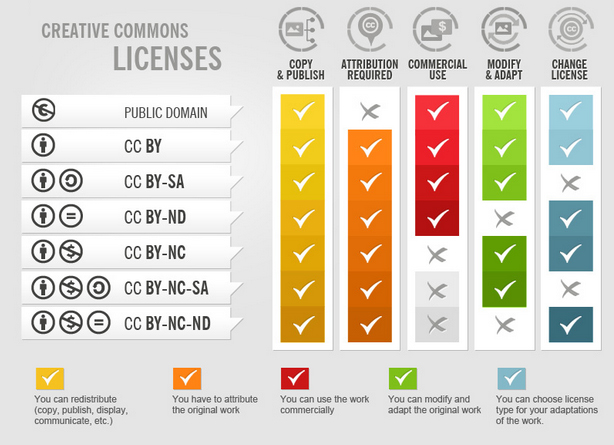 ] .pull-right[ ## Data [Creative Commons License Chooser](https://chooser-beta.creativecommons.org/) ## Software [Choose an open source license](https://choosealicense.com/) ####[Video on licenses](https://www.youtube.com/watch?v=xdBwuut6dRY&list=PL1CvC6Ez54KDvJbbdLn5rPvf1kInifEh9&index=5) ] .footnote[Image [Source](https://foter.com/blog/how-to-attribute-creative-commons-photos/): CC-BY-SA] --- # Software Licenses .pull-left[ ##Permissive Open licenses that do not require derivative works to shared with the same license. ###Examples: - CC BY - MIT, BSD, APL-2.0 #### [TU Delft approved licenses](https://docs.google.com/presentation/d/1jYrjZMjuZ5RchjIC97JfLPvClnzfzbGTq0KnXk_zp10/) according to the [TU Delft Research Software Policy](http://doi.org/10.5281/zenodo.4629662) and [Guidelines](http://doi.org/10.5281/zenodo.4629635) ] .pull-right[ ##Copyleft Open licenses that require all derivative works to be shared with the same license. ###Examples: - CC BY-SA - GPLv3, AGPL, LGPL, EUP] --- # Sharing software according to TU Delft Choose a pre-approved license (MIT, BSD, Apache, GPL, AGPL, LGPL, EUPL, CC0) #### Use [4TU.ResearchData](https://researchdata.4tu.nl/en/) - Log in (top right) using TU Delft credentials - Create a new item or import from GitHub/GitLab - Add relevant metadata in the information fields #### OR ####Use another repository ([Zenodo](https://zenodo.org/)) AND register the software in [PURE](https://pure.tudelft.nl/admin/) - Log in using TU Delft credentials - Select Datasets/Software -> Software - Fill out the metadata in the information fields and add DOI, select license and save the information .footnote[Full [slidedeck](http://doi.org/10.5281/zenodo.4772235) + [recording](https://youtu.be/bPl5sdTvLMM?t=1394) of how to publish software (from 23:14 onwards)] --- class: inverse, middle, center # How to link your publication and data/code? --- # How to link your publication and data/code? - Publish the output before you publish the article OR - Reserve the DOI ## Use the DOI/citation in your publication Reference your data in the **Data Availability Statement** and the **References** .footnote[ [The Turing Way: Linking Research Objects](https://the-turing-way.netlify.app/communication/citable/citable-linking.html) ] --- # Publish or reserving a DOI ### [Zenodo](https://zenodo.org/) -> [Upload](https://zenodo.org/deposit/) -> [New Upload](https://zenodo.org/deposit/new)  --- # Linking with publication ### Data accessibility/within table (descriptions) [](https://doi.org/10.1016/j.dib.2021.107375) ### Data availability statements (at the end) [](https://doi.org/10.1002/ajpa.24059) --- # Linking with publication  Always check the dataset's readme file or metadata on how the contributors prefer to be cited! See [this document](https://surfdrive.surf.nl/files/index.php/s/IJt6nPbRf0G9zYZ) for more information about data/software citation. --- background-image: url("https://raw.githubusercontent.com/EstherPlomp/2022-PRES-Data/main/images/schmid-2021.jpg") background-position: 50% 50% background-size: 50% # Linking data/code/publication .footnote[ [Publication](https://doi.org/10.1038/s41565-021-00958-5) // [Data & Code](https://doi.org/10.5281/zenodo.5059802)] --- class: inverse, middle, center # Where next? --- #Where next? ### **[TU Delft Open Science Community](https://osc-delft.github.io/)** > [Sign up](https://osc-delft.github.io/join) for a 2-monthly newsletter, Slack channel and visibility on the website. ### **[Open Life Science Programme](https://openlifesci.org/)** > PhD candidates can follow this programme for 5 disciplinary specific credits. See [intranet](https://intranet.tudelft.nl/-/open-life-science-programme) for more information. New applications will open over the summer with the programme taking place around September-December. ### **[The Turing Way](https://the-turing-way.netlify.app/welcome)** > There will be an online/hybrid event to contribute to the Turing Way in May/June. Contact Esther for more information. --- background-image: url("https://raw.githubusercontent.com/EstherPlomp/PRES-data-software/main/images/thank-you.jpg") background-position: 5% 2% background-size: 40% class: center, middle # Thanks! Slides created via the R packages: [**xaringan**](https://github.com/yihui/xaringan)<br> [gadenbuie/xaringanthemer](https://github.com/gadenbuie/xaringanthemer) [remark.js](https://remarkjs.com), [**knitr**](http://yihui.name/knitr), and [R Markdown](https://rmarkdown.rstudio.com) images by [The Turing Way](https://doi.org/10.5281/zenodo.3332807)